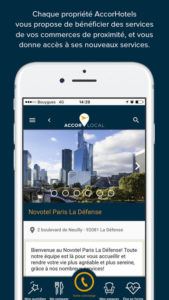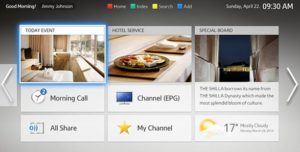Accor Hotels: The Transition of a Hotel Brand to a Hospitality Platform or “Augmented Hospitality”

“Hospitality must evolve towards more flexibility and be able to open the gates to non-travelers for a drink, a yoga course, a fitness room, etc. In other ways, we are targeting non-travelers by bringing hospitality outside the hotel. Through strategic partnerships, we are now offering our hospitality expertise in new playing fields, for example, such as co-working places.” Sebastien Bazin Accor Hotels CEO
Accor Hotels Europe’s biggest hotel brand doesn’t want to just be a hotel company, instead, they want to be a hospitality platform and a part of everyone’s life on a daily basis whether they are traveling or not. Accor hotels current strategy is to add new hotel every three days and the target is to increase that number to one hotel every day in the next 3 years.
Accor is following 3 strategies to switch from a hotel brand to a hospitality platform and service provider:
1- Divest their Real Estate portfolio
2- Expand their partnerships and acquisitions in tech and innovative brands – Smart Rooms
3- Extend their services outside of hospitality and servicing non-travelers
Divest their Real Estate portfolio
According to Simon Mezzanotte of Societe general, the main advantage of owning the brick-and-mortar is that the brand has a full control over the hotel, and the appreciation of the property. However, for most publicly traded brands the stock market fails to reflect the appreciation in property valuation, for example, the Ritz hotel in London appreciated fourfold from 2002 to 2006 to $980 million with no significant response from the stock market. (Economist, 2010) Marriott, for example, started divesting and selling their properties since the early 70’s and currently, the brand owns/leases less than 1% of their rooms. Hence, with more than 6,500 properties in their portfolio across 127 countries, Marriott only owns 6 properties in the united states in addition to another 13 properties worldwide.
Accor hotels have been following their competitors Marriott and intercontinental by transitioning to an asset-light brand. Between 2005 and 2009 the network has sold 841 properties and another 450 hotels in 2013. In 2018 Accor announced selling 55 percent of their stake in the companies’ real estate arm (valued at $7.64 Billion with over 1100 properties) to a consortium of institutional investors including Saudi Arabia’s Public Investment Fund and Singapore’s GIC Pte sovereign-wealth fund for a $5.4 billion. However, Accor will maintain up to 50 years management agreement for all sold properties with an option for renewal. (Smytn, 2018) Accor’s plan is to use these funds to expand with more acquisitions in emerging markets, technology, and regional acquisitions.
Expand their acquisitions in tech and innovative brands
Accor Hotels acquired more than 12 companies across different sectors in the last 2 years including Onefinestay a luxury short term rentals platform, John Paul a concierge services provider, Gekko an online hotel reservation platform and Raffles Hotel International. The hotel group’s CEO Sebastien Bazin has been an innovative market leader for some time stirring the company not only into top market upper-upscale products but especially expanding its presence in the lifestyle and short-term lodging segment. The hotel giant acquired companies, such as Sqarebreak, 25hours hotels, and Mama Shelter, to include in its new lifestyle division and created Jo&Joe a new lifestyle brand with the intention of capturing millennial demand for social hostel-hotel experience.
Smart Rooms
As part of Accor’s strategy to enhance travelers experience, the network has partnered with start-ups and tech companies to use internet of things, voice activation and other technologies to make their rooms more accessible and personalized. The company is including a variety of technologies including, Google Voice assistant, a tablet-controlled LED lighting, curtains, etc. it will also add sleep aids like Dreem headband for relaxation, and Aromatherapy aids like Sensorwake. Furthermore, Accor is looking to leverage their loyalty program and guests’ profiles to collect data, in order to understand their habits and personal preference to customize their experience, for example, what kind of music or tv shows they like, room temperature preference and favorite welcome drink.

Extend their services outside of hospitality and servicing non-travelers.
According to Sebastien Bazin Accor Hotel CEO. Accor’s business model is based on three pillars: Accor’s core business as a hotel operator, their business to business services and their business to consumer services for travelers and local, the main vision is to expand Accor’s services and improve guests and local non-travelers experience. Accor Hotels sees an opportunity to become a service and experience provider for travelers and non-travelers as well. Last year Accor acquired 50 percent of Nextdoor a social network company that allows users to connect with people in nearby neighborhoods, registered users will get informed about local events, babysitter request and any safety issues nearby.
In 2017 Accor released Accorlocal in France, an online application targeting local inhabitants who live around the hotel and not looking for a room but want services. Bazin said describing Accorlocal “zillions of services we’re going to get into,” among them having hotels assist locals with simple tasks and solving everyday solutions like holding packages or keys or recommending the best services nearby.“ [The hotel will be] a place that will make your life easier,” (Ting, 2017) According to AccorLocal’s CEO Scott Gordon locals are using the application to book Yoga classes, pick up dry cleaning, order flowers and pick up breakfast on their way to work, in addition to Amazon Locker locations provided by the hotel. Accor formed partnerships with local dry cleaners, florist, bread makers, coffee shops and other service providers to lower their operating cost while being able to provide these services 24/7.
Accor charges the merchant 10 to 20 percent communion on each transaction, the commission is equally split between the Accor and the hotel owner, if the hotel provides the services, like Yoga classes of using the gym, Accor collects 10% commission fee. Accorlocal acts, in this case, a platform for local business to reach out to their customers without investing in their own application or marketing. In addition to that Accor collects data from users and businesses on cost, pricing, activities, and habits to integrate the local experience in their hotels as well as expand their offering of shared working spaces, cafés, fitness rooms. restaurants, etc. to non-travelers, creating a community rather than a traditional hotel.
Advanced technologies and features may enhance guests experience and help hotel brands to expand their market, however, there are multiple challenges that are facing hoteliers:
1- Convincing property owners to invest in incorporating these technologies
2- Overcome customers’ privacy concerns
3- Overcome the technology barrier for customers and their ability to seamlessly use it.
Implementing these new technologies will require extra capital by hotel owners, with the hospitality industry transition from asset-heavy to asset light, Hotel brands don’t have as much control over their properties, as a result, the brands will have to make the case and convince their partners to invest in adding these features in their properties. Karim Khalifa Marriott’s senior vice president of global design strategies is convinced that the added technologies will have a significant return on investment, including savings on energy, data cable, and labor. Ting, 2017)
There are concerns regarding sharing your data on applications or using voice activated technologies, guests may feel uncomfortable with having cameras or microphones in hotel rooms, as they may be recorded all the time. Customers are also concerned about sharing their data and personal information, however, using voice-activated devices and other smart home features at home like Google home or Amazon Echo dot will make it easier for guests to adapt with these technologies. Finally, as any new technology, there is always a learning curve and hotels need to be inclusive and don’t expect all their guests to understand their new tools and know how to use them especially that some of these technologies are not totally reliable yet.
Accor Hotels and other major branded hospitality companies are realizing that their core business should be focused on services and not real estate investment, expanding their brand and offerings became a higher priority to increase their valuation. As a result to that, hotel brands have been switching their business model from asset heavy to franchises and operation with a more asset-light business model, instead of buying new properties they are investing in tech companies, services, and innovative startups, in order to survive in such competitive sector.
http://www.accorhotels.group/en/innovation
https://www.hotelmanagement.net/operate/accorhotels-details-new-smart-room-concept
https://www.economist.com/node/17463399
https://skift.com/2017/11/14/hilton-and-marriott-turn-to-the-internet-of-things-to-transform-the-hotel-room-experience/
https://www.forbes.com/sites/karenhua/2016/08/09/oasis-collections-where-the-rich-and-famous-are-staying-in-rio/#14c6270044a5





